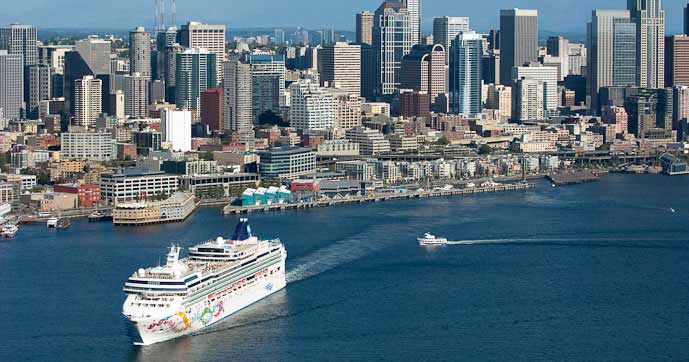The Port of Seattle, Port of Tacoma, and the Northwest Seaport Alliance (NWSA) have written a joint letter urging the US delegation to show strong action for reducing international maritime GHG emissions and underwater noise during negotiations at the upcoming IMO MEPC 76.
The letter, addressed to Secretary John Kerry, Special Presidential Envoy for Climate, US Department of State, and Jeffrey G. Lantz, Director of Commercial Regulations and Standards, US Head of Delegation to the IMO, USCG, expresses gratitude for the active US engagement in the IMO environmental work and expresses strong support for the adoption of clear guidelines on short-term GHG reduction measures at IMO MEPC 76 on 10-17 June.
To remind, amid an increasing pressure towards shipping decarbonization, Kerry called earlier in 2021 the IMO to guide the industry towards zero emissions by 2050.
Simply put, we cannot achieve the vision of becoming zero-emission seaports without stronger international policies and programs to phase out emissions from international shipping and create a “level playing field” across all seaports. We are requesting strong leadership by the US in support of international action at the IMO in line with the Intergovernmental Panel on Climate Change recommendations to reduce global climate pollution,
…the joint statement reads.
[smlsubform prepend=”GET THE SAFETY4SEA IN YOUR INBOX!” showname=false emailtxt=”” emailholder=”Enter your email address” showsubmit=true submittxt=”Submit” jsthanks=false thankyou=”Thank you for subscribing to our mailing list”]
The letter signatories represent three port entities in the state of Washington: Port of Seattle, Port of Tacoma, and the NWSA, which is a marine cargo operating partnership between those two ports. In April 2021, the three ports, along with the Vancouver-Fraser Port Authority in British Columbia, Canada, adopted the 2020 Northwest Ports Clean Air Strategy, which sets a shared vision to phase out seaport-related emissions of both diesel particulate matter and GHG emissions by 2050 at the latest.
In their letter, the ports applaud the initial climate strategy adopted by the IMO in 2017, but note that its central goals – to reduce total carbon emissions from international shipping 50% by 2050 and to phase out GHG emissions “as soon as possible this century” – must be strengthened as the IMO works toward adopting a revised strategy in 2023.
Moving to the issue of underwater noise from large vessels, which continuously affects whales and other marine life, the ports supported the proposal that was put forward in the MEPC 75 last year by the US, Canada and Australia calling for the MEPC to review the 2014 document, Guidelines for the reduction of underwater noise from commercial shipping to address adverse impacts on marine life (MEPC.1/Circular 833) and consider action.
The signatories also welcomed the International Whaling Commission’s support of that submission to
MEPC 76, and the findings of the MEPC 76 submittal on the Belgium desk studies on underwater noise impacts (MEPC 76/INF.17) that addresses the beneficial underwater noise impacts from energy efficiency improvements.
We urge the U.S. delegation to push strongly for improved international standards to reduce underwater noise from vessels, including new technologies and ship designs,
…the letter says.
To address that issue, the ports recently led the creation of their Quiet Sound program to better understand and reduce the cumulative effects of acoustic and physical disturbance from large commercial vessels.
While we understand the impact of the COVID-19 pandemic deferred discussions on proposals for new outputs related to underwater noise to MEPC 76, we strongly urge the US delegation not to let these discussions be deferred again…Should negotiations on the short-term measures consume the available meeting time for MEPC 76, we recommend an intersessional solution be proposed so that these important discussions are not further delayed,
…the ports concluded.






























































